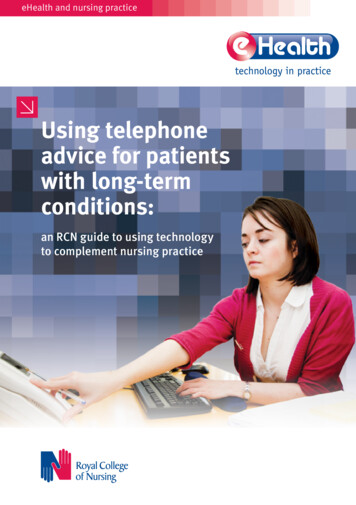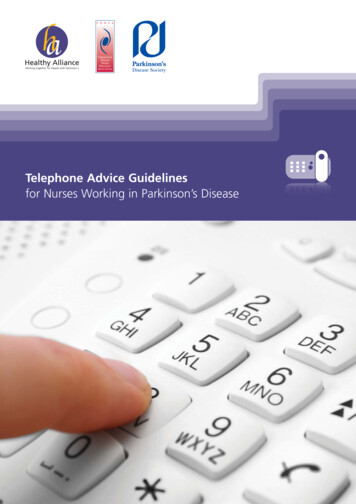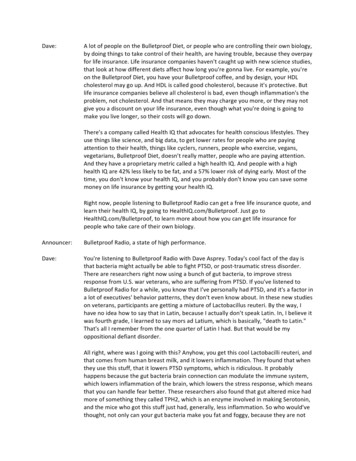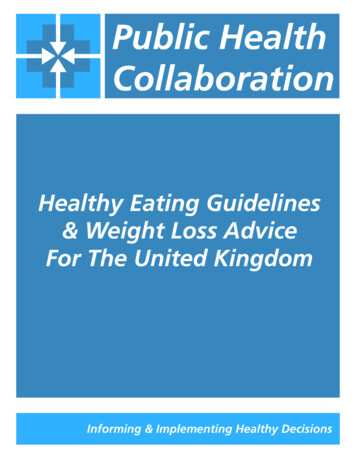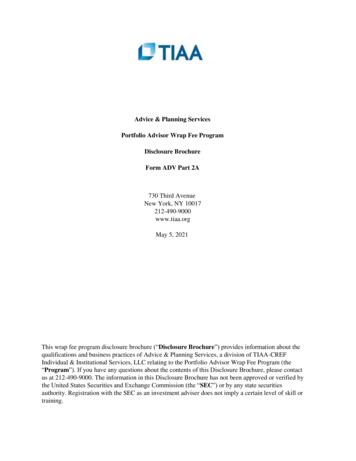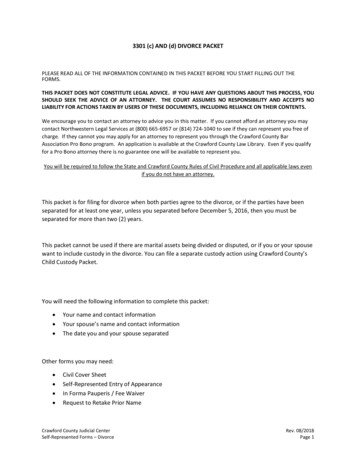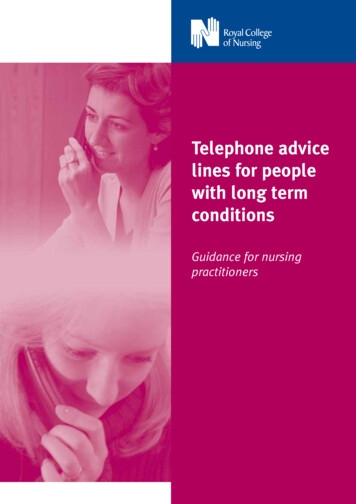
Transcription
Telephone advicelines for peoplewith long termconditionsGuidance for nursingpractitioners
AcknowledgementsThis publication has been produced by the RCNRheumatology Forum. They would like to thank allnurses and patient organisations who reviewed draftdocuments and provided valuable guidance in thedevelopment of this document, and to the workingparty members and email reviewers for theircontribution. A full list of the major contributors canbe found in Appendix 10.RCN Legal DisclaimerThis publication contains information, advice and guidance to help members of the RCN. It is intended for use within the UK but readers are advised that practices mayvary in each country and outside the UK.The information in this booklet has been compiled from professional sources, but its accuracy is not guaranteed. Whilst every effort has been made to ensure the RCNprovides accurate and expert information and guidance, it is impossible to predict all the circumstances in which it may be used. Accordingly, the RCN shall not be liableto any person or entity with respect to any loss or damage caused or alleged to be caused directly or indirectly by what is contained in or left out of this websiteinformation and guidance.Published by the Royal College of Nursing, 20 Cavendish Square, London, W1G 0RN 2006 Royal College of Nursing. All rights reserved. No part of this publication may be reproduced, stored in a retrieval system, or transmitted in any form or by anymeans electronic, mechanical, photocopying, recording or otherwise, without prior permission of the Publishers or a licence permitting restricted copying issued by theCopyright Licensing Agency, 90 Tottenham Court Road, London W1T 4LP. This publication may not be lent, resold, hired out or otherwise disposed of by ways of trade inany form of binding or cover other than that in which it is published, without the prior consent of the Publishers.
ROYAL COLLEGE OF N URSI NGTelephone advice lines for people withlong term conditionsGuidance for nursing practitionersContentsForewords2Appendices1. Executive summary3Appendix 1172. Introduction3References (with note onrecommended reading)3. Methodology5Appendix 2Bibliography194. Principles of good practice6Appendix 3Grading of evidence usedin this document21- Good communication6Appendix 4An overview of the evidence:the development and efficacyof advice lines22Appendix 5Example patientinformation sheet23Appendix 6Example telephone adviceline card24Appendix 7Example call sheets25Appendix 8Examples of patientorganisation and adviceline services27Appendix 9Telephone and websiteresources29Appendix 10Working party members31- What the telephone consultation should cover 6- Safety of advice6- Medication75. Setting up a service7- Managing expectations and needs ofevolving services7- Planning and managing a service8- Setting out a business case96. Service provision11- Staffing and time management11- Succession planning12- Evaluation and audit127. Governance issues13- Risk management13- Legal issues13- Documentation14- Training and competency148. Clinical issues15- Promoting self-management not reliance15- Returning calls15- Managing time-consuming calls15- Limitations of telephone advice lines169. Conclusion171
TELEPHONE ADVICE LI NES FOR PEOPLE WITH LONG TE RM CONDITIONSForew0rdForeword from Beverly MaloneForeword from Carol BlackThe telephone is an essential and effective means ofcommunicating and sharing information in our society.In many health care settings now, telephone services areproviding innovative approaches to delivering servicesand providing advice. For those people with a long termhealth problem, such services can be invaluable,because they provide expert advice when selfmanagement strategies fail to achieve health benefits orcontrol symptomsThe Royal College of Physicians recognises theimportance of supporting and working with patientsand established a patient and carer network in 2003 tobuild upon the strong collaboration between patientsand physicians to improve health care outcomes. I amtherefore delighted to see that the working party whodeveloped this guidance included patient-ledorganisations. This guidance document will be avaluable resource for practitioners who providespecialist telephone advice to individuals with longterm conditions.This document supports practitioners who providetelephone advice. It outlines important steps indeveloping high quality, sustainable and cost-effectivetelephone services, working with the local communityand patient organisations.Professor Carol BlackPresident, Royal College of PhysiciansI warmly endorse this guidance, which provides a muchneeded framework for practitioners providingtelephone support to individuals with long termconditions.Beverly Malone RN PhD FAANGeneral Secretary, Royal College of NursingForeword from Bridgit DimondCommunication has always been at the heart ofpatients’ health care and telephone services are nowdeveloping this further. Health practitioners who aregiving advice over the ‘phone need to be aware of thepitfalls and the limitations of this form ofcommunication. A nurse is accountable for caredelivered by telephone, but if she ensures that standardsare in place to provide the reasonable care which thepatient requires, then she will also protect herself andher colleagues from complaints and potential litigation.This guidance from the Royal College of Nursing (RCN)comes at an apposite time. It provides not only theadvice needed to establish a telephone advice servicefor patients with long term conditions, but alsoguidance to ensure that the service follows best practiceand is regularly monitored to maintain standards.Helpful appendices provide examples of log sheets, andinformation on patient organisations. Practitioners willwelcome this document as a significant resource for theestablishment and maintenance of high standards in achallenging area of health care.Bridgit DimondEmeritus Professor, University of Glamorgan2
ROYAL COLLEGE OF N URSI NG 1 2Executive summaryIntroductionThis guidance gives advice for practitioners whoprovide, or are developing, telephone advice servicesfor people with long term health conditions.Telephone advice line services provide a valuablecontribution to initiatives that focus on promotingpatient empowerment and the use of self-managementstrategies for individuals (and their partners or carers)with long term conditions (LTCs). Such services forman important addition to care, providing ongoingsupport and education to individuals (ARC, 1997;Arthritis and Musculoskeletal Alliance, 2004).Key recommendations include:Principles of good practiceBefore providing such a service, nurses shoulddemonstrate:The quality and equity of service provision may varyacross the UK. However, to ensure safe practice andsupport practitioners in their developing roles, it isimperative that there are clearly documentedframeworks. Guidance on the use of telephone advicelines have been published in the past (TelephoneHelpline and Broadcast Support Services GuidanceGroup, 1993; RCN, 1999). The changes in practitionerroles and responsibilities and the increasing changes inhealth care provision now highlight the need for newguidance. There also remains a wide variation inpractice between specialist fields, and a lack of nationalguidelines (McCabe et al., 2000). competencies in communication and consultationskills in routine clinical practice effective clinical decision-making skills awareness of governance issues that reflect safepractice and reduction of any potential risks relatedto telephone advice.Setting up a servicePractitioners should: identify the needs of the community who will access the service including ethnic and minoritygroupsscope local and national patient-led organisationsthat can provide complementary support forindividuals with long term conditionsprepare business proposals that include timemanagement and financial planning for asustainable serviceprovide an explicit remit of services and identifyclinical supporting services and the potentialimpact on specialist servicesprovide appropriate documentation includingpatient information leaflets and auditseffectively manage user and professionalexpectations.The Royal College of Nursing Rheumatology Forum(RCNRF), along with members of the rheumatologypatient and professional groups recognised the need todevelop new guidance. A wide range of other fields ofnursing practice and patient organisations wereconsulted to contribute to the development of thisdocument. It gives advice for practitioners who provideor are developing telephone advice services to peoplewith long term health conditions. To inform thisguidance evidence was reviewed and graded (seeAppendices 3 and 4). The working party alsoconsidered issues related to the training andcompetencies required as well health care outcomesand cost analyses.Service provisionThe term ‘helpline’Nurses providing the service should:The term ‘helpline’ is well recognised by providers andusers. However, the RCNRF working party stronglyadvocates referring to such telephone support as ‘advicelines’. This is to highlight the strong emphasis on selfmanagement principles when accessing telephoneservices, and therefore setting caller expectations in amore realistic context (Thwaites, 2004). adhere to governance and legal issues keep clear documentation and records plan for the ongoing training and support needs ofpractitioners, including clerical support identify and manage difficult issues related totelephone advice line support provide regular reviews and evaluation of services,including audit and other appropriate outcomemeasures.The recommendations in this document should besupported by additional information and guidancerelated to the practitioner’s specialist areas of practice.3
TELEPHONE ADVICE LI NES FOR PEOPLE WITH LONG TE RM CONDITIONSdocument we ask practitioners to refer to the keyreferences to support the brief outline provided in here.Aims of the documentThe document aims to:It has been suggested that as a result of the rapidgrowth of telephone consultations, future diseasespecific guidelines should include information relatedto assessment and appropriate advice following atelephone consultation (Car and Sheikh, 2003; Car etal., 2004). Although this is not covered in this guidance,we recommended that practitioners consider theseissues when extending the scope of telephone services. provide a framework for practice, recognising thatadvice line support is a pivotal resource whichshould be adequately planned and managed identify and grade research undertaken in this areaof practice, highlighting examples of best practiceand opportunities to develop innovative approachesto supporting individuals with LTCs aid practitioners in their understanding of patientled telephone advice lines and collaborative ways ofworking to enable the optimum care for the serviceusers guide practitioners in planning a telephone adviceline service ensure the advice line is sustainable over time, withappropriate infrastructure and succession planning discuss the competency frameworks that should beconsidered when practitioners provide advice lineservices highlight limitations in services, including how theneeds of minority ethnic or cultural groups may notbe adequately served by routine telephone advice provide examples of appropriate documentationand supporting legal issues that should beconsidered when providing telephone advice lineservices provide a resource with useful links and telephonenumbers, additional reading and references forthose wanting to develop their services.The RCN hopes that the collaborative approach toimproving care taken in this guidance will be the firstof many initiatives focusing on the needs of those withLTCs.Guidance is not provided in this document for: surgical pre-treatment or triage telephone services systems to replace primary care consultations oraccident and emergency call out services computer assisted telephone services (such as NHSDirect) telephone consultations in place of routinefollow-up appointments email or web-based interactive support services mobile phone texting patient-led charitable organisation telephoneservices.This document may be a useful reference point forregistered nurses employed by charitable organisations.Practitioners may also find it helpful to refer toexamples of the work that patient organisations canprovide to complement those provided by the specialistunits.For further information see Section 6 and Appendix 7.Using the guidancePractitioners should use this guidance in the context ofthe local needs of their own patient group and serviceprovision, and within local and national NHS policy,including clinical governance frameworks. Werecommend that specialist practitioners, particularlythose working with individuals with LTCs, developdisease-specific information to support this document.Website links can be found in Appendix 9.Each section of the document identifies the researchevidence and grades it according to the Royal College ofPhysicians’ guidelines (2003). The working party hasattributed recommendations to each section andgraded these based on research evidence and workingparty consensus. We recognise the value of measuringservice and caller outcomes, but given the scope of this4
ROYAL COLLEGE OF N URSI NG 3outpatient follow-up services. These references havebeen added as a resource for the reader.MethodologyA full list of the references is given in Appendix 1 and atable showing the grading criteria and grading of allevidence used in developing the document is given inAppendix 3.ContributorsThe RCNRF recognised that the lack of currentguidance on providing telephone advice services is notunique to musculoskeletal services. A working partywas set up to develop this guidance document, invitingcontributions from a wide range of specialists andpractitioners from other specialist fields of practicewho care for individuals with LTCs.Background to thedevelopment and efficacy ofadvice linesFor a review of the evidence in this area,see Appendix 4.The RCNRF also asked patient-led organisations tocontribute. Patient-led organisations provide valuabletelephone support, which complement servicesprovided by health care professionals to ensure thatindividuals are empowered to manage their conditionseffectively. These organisations have a wide perspectiveon the needs of their members and they areincreasingly involved in all areas of health careprovision, including telephone advice lines.Additional participants contributed by reviewing thework via email. These participants included specialistnurses working in various health care settings,reflecting the diversity of needs of the patient groupsacross the UK. The consultation process enabled reviewand feedback on draft versions and highlightedadditional issues for consideration. Appendix 10 gives afull list of working party members and the lead emailcontributors.Reviewing evidence for thedocumentAlthough the evidence base for telephone support islimited, it was essential that a rigorous approach toreviewing the available literature was applied.The evidence base was reviewed using the AGREEGuidelines (AGREE Collaboration, 2001) and RoyalCollege of Physicians’ Concise Guidelines(RCP, 2003 – see Appendix 3).Where there was limited evidence, expert opinion wassought by working party consensus. Also included areaudits and abstracts that may be of particular interestto readers. These are identified in evidence review by ahash sign (#) to ensure readers are aware that these donot fit the full grading criteria.References to the research/papers used are giventhroughout the text. Some sources are not directlyrelated to simple telephone advice lines for individualswith LTCs, but cover innovative aspects of care (such astelephone triage and telephone consultations) replacing5
TELEPHONE ADVICE LI NES FOR PEOPLE WITH LONG TE RM CONDITIONS 4Principles of goodpractice clarification of the diagnosis and current treatment,Good communication The principles of good communication apply to allconsultations, but nurses/practitioners must be mindfulthat aspects of normal communication – visualprompts, gestures and physical contact – are missingfrom telephone consultation. Before providingtelephone support, nurses should have demonstratedtheir competency in undertaking consultations inroutine care. For a successful telephone consultation, it is importantto have: a conducive environment with minimal distractions and background noisepatient confidentiality/privacy throughout theconsultationgood equipment to ensure appropriate soundqualityaccess to documentation/record keeping and, whereavailable, electronic patient recordsan empathetic manner, including reassurance andreiteration of the issues to confirm the callersconcerns and needssufficient time available to acquire the necessaryinformation from the caller, ensuring sound clinicaldecision-makingthe ability to provide clear and concise advice withguidance. monitoring or recent medical interventions/problems/dates of future outpatient appointmentsconfirmation of all prescribed medicationsincluding over-the-counter (OTC) andcomplementary therapiesany other medical or surgical treatments the calleris receiving from other specialistsany specific social or psychological issues that maymake the caller more vulnerable and requireadditional support or rapid access to key services(e.g. cognitive impairment, mental health problems,or frail elderly)clarity and agreement on the steps necessary toresolve the problem or seek further helptime frame for self-management strategies ifadvised, when to review the success of suchstrategies and who should review themwhat the caller should do if problems continuea mutually agreeable time to return a call if afollow-up is planned. Agreement about who willinstigate the review callreview of decisions and closing call with clearoutline of plan.Safety of adviceIt cannot be over emphasised that that there should beclarity about the aims and objectives of the service. Theremit of the nurses/practitioners providing the supportshould also be clearly defined. In particular, nursesshould be clear about their remit regarding changes oftreatment or dosages and supporting documentation.All health care professionals providing support topatients should be aware of the advice line and theservices that can be provided to patients and otherhealth care professionals. Patients using the serviceshould be aware of the sources of information availableto them and the topics covered.What the telephoneconsultation should coverKey informationAt times verbal advice provided on the advice line mayneed to be supported by correspondence (to teamsproviding care or sometimes the patient themselves)outlining the plan following the consultation.The caller’s name, date of birth, hospital number oraddress, telephone number, usual partner/carer andpermission to discuss information with partner/carershould a return call be required.Specific protocols for safety of advice that practitionersmust consider (Lattimer et al., 1998), backed up by anagreed framework for practice, relate to:Clear advice and guidanceCovering: changes of treatment – advice that can be given and what the caller and nurse/practitioner have agreeddocumentation (see Section 7) informing the specialist or primary care team, (oris the current problem and the specific advice thatthey seekothers involved in the patient’s care) of anyadvice/problems reported and advice given6
ROYAL COLLEGE OF N URSI NG 5 documenting any referrals to other teams/specialist Setting up aservicepractitioners and planned feedback or outcomespathways to ensure efficient referral to other healthcare professionals following callclinical supervision for nurses/practitionersguidance on difficult calls and resolving telephonecomplaintsclosing the consultatio
This guidance from the Royal College of Nursing (RCN) comes at an apposite time. It provides not only the advice needed to establish a telephone advice service for patients with long term conditions, but also guidance to ensure that
